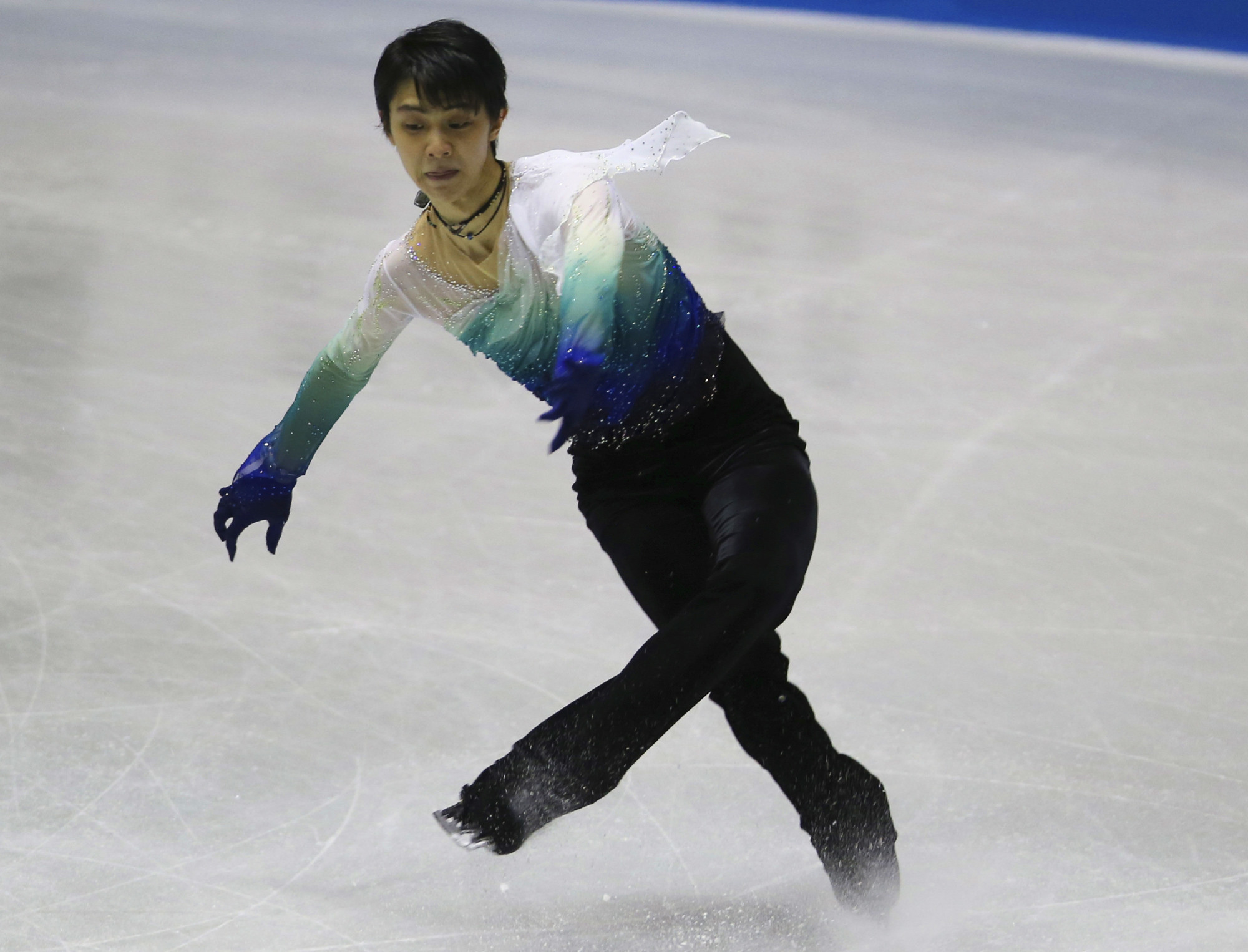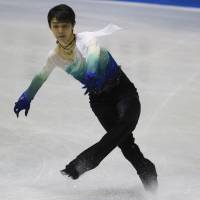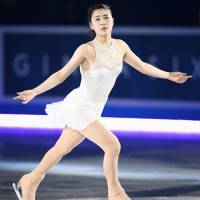Yuzuru Hanyu's greatness is unquestioned.
Olympic champion, world champion, holder of multiple world records, he is quickly becoming the giant of his generation.
Now the 22-year-old is planning for the future and examining how he can improve even more. Speaking to the media after his winning free skate at the World Team Trophy on Friday, Hanyu detailed his thoughts on the path forward.
"I think what was successful about this program today, although not perfect, was to shape things up in terms of the triple to the quad," stated Hanyu, who landed a quad toe loop/single loop/triple salchow combination for the first time. "I was genuinely happy about that. I was able to gain confidence that I can use that toward next season."
Hanyu used the new combination instead of the triple axel/single loop/triple salchow he did in his glorious free skate at the world championships in Helsinki earlier this month.
"However, at the same time, I didn't have enough practice in that change in program, so I felt that I really needed to build my strength to be successful next season," Hanyu noted.
"Although I was only able to cleanly land four of the five quads, I was still able to take on that challenge of performing five total," commented Hanyu. "So that was something huge for me."
Hanyu admitted strategic thinking played a part in the move.
"The fact that I was able to successfully land three quads in the latter half of the program (when there are bonus points awarded) was a big thing for me," Hanyu said. "I would say it was an achievement and an accomplishment. So I'm very happy."
Hanyu confirmed that he has been pondering the additional quad for a while.
"It has always been on my mind that I wanted to jump five quads," Hanyu stated. "After the short program (where he was seventh) I was very disappointed and wasn't able to sleep. So I kept waking up at 3 to 4 in the morning in the hotel. I was sort of imagining in my head what I should be doing, what I should be preparing for. I guess that is when I decided I would jump that additional quad."
Like a true champion, Hanyu said he wanted to give it his all.
"I decided I didn't want to have any regrets, so I just want to go in and challenge myself in this program," Hanyu said. "I was able to come down solid for the three quads in the second half of the program. In recovering for next season and toward the Olympics, I want to raise the bar regarding what my average skills are and what I can do on an average basis.
"In that sense, I think I was able to get through those quad jumps during the latter half at around the same quality I would jump in the beginning," Hanyu commented. "That was something big for me. I would love to work this to my advantage for next season."
Hanyu was not yet ready to commit to doing five quads in his free skate next season, however.
"I do still want to think about it, but I think I was able to perform and give a presentation that is more like myself than other performances I have done," Hanyu said. "With that sort of positive thought in mind, I would like to take on the challenge as much as possible."
Hanyu detailed what he was thinking during his free skate on Friday.
"A lot was going on in my mind. Should I go from the Ina Bauer to the axel? Should I include a mohawk or an eagle in between?" Hanyu recalled. "That is one of the reasons I wasn't able to come down as clean as I wanted to. But I still wanted to go after the most challenging of all efforts. As long as I build on more strength and am mentally prepared, I will be more successful."
Hanyu didn't limit his comments to just jumps. He also addressed his step sequence and being more aggressive with it.
"This was always something that I wanted to do. It was a challenge for me," Hanyu stated. "I put a lot of motion into my steps, but I wasn't able to control things as much as I wanted to," he said of Friday's free skate.
"I wouldn't say at the world championships that it happened by coincidence," Hanyu added. "I was able to control the steps, but I wanted to have a little more control for what I was doing in this program so I could make sure I am on the right path to scoring more."
Coming on strong
What a difference three weeks makes.
Mai Mihara and Wakaba Higuchi, who finished a combined 16th at the world championships late last month while unsuccessfully trying to secure three spots for Japan in women's singles at the Pyeongchang Olympics, were very impressive at the World Team Trophy.
The two youngsters especially sparkled in Saturday's free skate when the title in the team event was on the line. Both Mihara and Higuchi recorded personal bests, with the former setting a Japan record for score in a free skate (146.17) by a female while finishing behind world champion Evgenia Medvedeva.
The total scores in the short program and free skate posted by Mihara (218.28) and Higuchi (216.71) in Tokyo would have placed them second and fourth, respectively, at the worlds, easily giving Japan the third spot for Pyeongchang.
The 17-year-old Mihara found inspiration after happening to come across an airing of "Cinderella" on television earlier in the week. She used the music from the film this season for her free skate, including her record-setting number on Saturday.
"After watching it I renewed my recognition of Cinderella's strength and I wanted to really show that in my program," commented Mihara. "It's beautiful music and I wanted to have the audience enjoy that."
Mihara is determined to utilize the knowledge acquired in her first season on the senior circuit moving ahead.
"This season there were a lot of changes skating as a senior for the first time," Mihara said. "Whatever I have learned I want to make full use of going into next season."
Higuchi was pleased to end this campaign on such a high note.
"Today's program will give me good momentum for next season," stated Higuchi after her free skate on Saturday. "If I can skate my new programs like I did today, that would be good. Both Mai and me were able to perform a perfect short and free, so that was great."
Looking ahead to the Olympic season, the 16-year-old Higuchi is aiming to boost her scores.
"We need to have a program that will score higher," Higuchi said. "So I will try to do better axels. I will even try triple axels so I will have a higher score."
Memories of Mao
Three-time world champion Patrick Chan spoke to Ice Time exclusively during the World Team Trophy about the recent retirement of Mao Asada.
"I get chills just thinking about it," stated Chan, who at 26 is the same age as Mao. "She is from my generation. We are some of the last skaters to come from a very important generation of skating. The transition from the Michelle Kwan era to now with the Medvedevas.
"We were the skaters who embraced the transition of the new judging system," added Chan. "For me, I am so happy for Mao because it takes a lot of guts, strength and independence to make that choice."
Chan acknowledged that Mao's popularity in Japan must have made her decision difficult.
"In a country like this, where skating is (so popular), that's a huge decision. We don't realize in North America how big skating is here," commented Chan. "I aspire to be as successful as she is, as iconic as she is. That is my goal — to be a Mao Asada in Canada. Because those type of athletes are very rare now."
It is clear that what resonated most with Chan is the same thing that has with so many people around the world — Mao's inner beauty.
"For her to be so humble with the amount of fame, success and stardom that she has had, she is the epitome of a good role model for the future," said Chan. "I have spent skating tours of two or three weeks with her where I forget about how really famous she is and the notoriety she has in this country.
"I completely forget (about her fame) because of her sense of calm, and that life is life, and everyone is a normal human being no matter the type of success that they have had."
Ice Time also talked to Rafael Arutunian, who coached Mao for 16 months during the 2006-07 and 2007-08 seasons, about his recollections of working with the young prodigy.
"The thing I remember most is her incredible work ethic," Arutunian said with a smile. "She would get to the rink at 9 in the morning and not leave until 9 at night. She would be there for 12 hours."
Ice Time asked Arutunian if this was Mao's schedule six days a week.
"No. She did that seven days a week," he said. "It was amazing."
Arutunian, who led Mao to the silver medal at the 2007 worlds, said he was a bit concerned about the long hours she was keeping at the rink and took her aside to talk about it.
"I spoke to Mao and asked her, 'Why are you training so much?' "
Arutunian said Mao looked at him and said, "Because I love to skate."
Miyahara working way back
A reliable source has informed Ice Time that three-time national champion Satoko Miyahara, who was forced to withdraw from the Four Continents and world championships due to a hip fracture, has been doing daily rehabilitation work at Japan's National Training Center in Tokyo.
In the wake of Mihara and Higuchi's fine performance at the World Team Trophy, Miyahara, who once seemed like a lock for one of Japan's spots for Pyeongchang, is now very much a question mark.
The fine finish to the season for Mihara and Higuchi, along with the arrival of talented juniors Marin Honda, Kaori Sakamoto and likely Yuna Shiraiwa, make Miyahara's path to the Olympics a bit more complicated.
Miyahara's ability to return to full fitness will be crucial if her bid is to have any chance at being successful.
Kanako bids farewell
Kanako Murakami announced her retirement from competition during the World Team Trophy exhibition on Sunday. The 22-year-old, who had struggled with her results the past couple of seasons, decided it was time to bow out.
Known as "Mini-Mao" when she first came on the scene, the Nagoya native was the 2010 world junior champion. The high point of her senior career came when she finished fourth at the 2013 world championships behind Yuna Kim, Carolina Kostner and Mao.
Murakami won Skate America (2010) and the Four Continents (2014), and finished second at the Japan nationals twice (2012-13).
I will always remember her gutsy effort in the free skate at the 2013 nationals, when she rose to the occasion in the face of incredible pressure to make the team for the Sochi Olympics (where she was 12th).
Murakami will become a show skater now, and with her radiant smile and cheerful demeanor, will certainly have many opportunities in the future.
Ice Time wishes Murakami all the best.



















With your current subscription plan you can comment on stories. However, before writing your first comment, please create a display name in the Profile section of your subscriber account page.